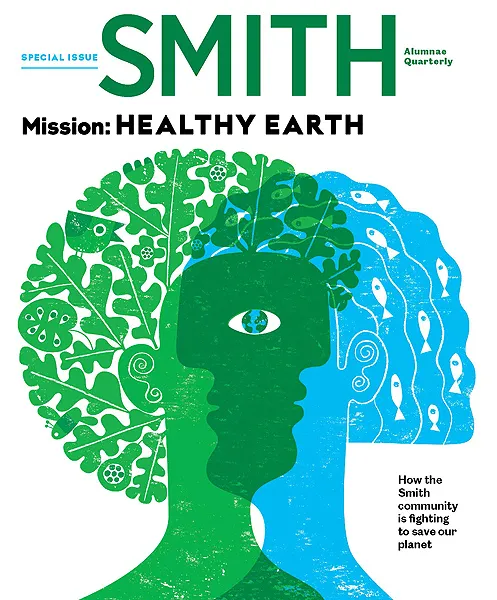Art of Persuasion
Sustainability

Published April 16, 2020
The course catalog entry for associate professor Camille Washington-Ottombre’s writing seminar in the environmental science and policy program last fall invited students to “stop stressing about climate change and learn how to write to make social change happen.” Among other types of writing, students tried composing newspaper op-eds on climate topics that concerned them. The following excerpts give a sense of the issues that occupy students’ thoughts.
Natalie Baillargeon ’21 spent the past two summers as an Arctic scientist in Alaska as part of the Polaris Project. During her fieldwork, she measured the depth of thawing in the permafrost, which is already forcing Alaskans to rebuild houses and roads.
“The complete loss of permafrost would have irreversible consequences that would not only impact Alaskans but the entire globe. Permafrost stores a vast amount of greenhouse gases, such as methane and carbon dioxide. In fact, it stores twice as much carbon as in the atmosphere. If that concentration of greenhouse gases were released into the atmosphere, there would be catastrophic impacts on our climate, accelerating warming like never before. For this reason, the thawing of permafrost is considered the sleeping giant: Scientists believe that if this threshold is passed, the climate would be unrecognizable and likely have impacts that we cannot imagine. The thawing of permafrost is already changing life for Alaskans and Arctic scientists alike, and without action, it will affect everyone’s lives. While rebuilding homes and intense heat waves will likely soon be the new normal for Alaska, it does not mean that it is too late to act; instead, it should be a stark warning.”
Alicia Hunter ’20 writes about the environmental benefits of composting food waste and even turning human bodies into compost.
“Imagine if all our waste became a resource instead of a contributing problem. Most people don’t realize how much food they throw away. Research says one-third of food produced ends up in a landfill (in 2017, that was 38.1 million tons). If we compost this amount, we could create more than 38.1 million tons of super soil. Learning from Recompose, [an organization that intends to restore] land in Washington state with composted bodies, we can help by stopping food waste in landfills and instead restore our local land with this magical gross substance, compost.”
The actions of Divest Smith inspired Rebecca Sassone Miller ’20 to write about the influential role of campus activism.
“The divest movement within campuses is predicated on the belief that prestigious universities can effect environmental change by using their positionality as wealthy stakeholders to direct funding away from harmful industries and toward sustainable ones. In the wake of climate change, we must move beyond individual actions like reduce, reuse, recycle and attack the problem at its industrial and capitalist roots. … In a capitalistic world where corporations are exponentially more harmful to the planet than individuals, movements that put pressure on toxic industries (not the people at the mercy of said industries) are vital to achieving environmental justice. Divest gives me hope that climate change activism is heading in a new, sustainable direction focused on a broader picture of what the world requires from them. The young people of Divest are approaching their college education as a vehicle for their own betterment as well as the betterment of the planet. They are growing simultaneously with their grassroots organization, and that growth is beautiful to behold.”
Olivia Cooper ’20 recalled the fire-alert robocall she received from her home community in Mendocino County, California, where wildfires have become a fact of life, adding new health threats.
“On that early October morning two years ago, my mom eventually called me back. My family and house remained safe, but not everyone was that lucky. The Redwood Complex fire devastated the local community, wreaking havoc on houses, ranches, businesses and people’s well-being. To ensure all of our community members can access adequate health care as we prepare for the impending onslaught of wildfires, we need to get organized with more than just burn boxes [evacuation kits to protect essential items and records]. Through outreach and community organization similar to recent emergency preparedness programs, health care professionals and community members at large need to get informed about the dangers wildfires impose on our physical and mental health, as well as who is most at risk. Like many in Mendocino County, my mom and I now have a burn box and a plan for the next wildfire. Now, as wildfires blaze on, it’s time for our community to get organized with our health care, too.”
This story appears in the Spring 2020 issue of the Smith Alumnae Quarterly.
SMITH ALUMNAE QUARTERLY
Special Climate Issue

Mission: HEALTHY EARTH
How the Smith community is fighting to save our planet
Students try their hand at op-eds to argue for climate remediation. Illustration by Ariel Davis